Sherlock Holmes: Crimes and Punishments – Review
by Edward
|
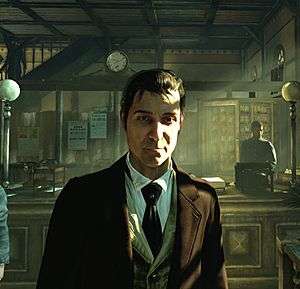 When it comes to committing a faux pas, murder’s a pretty big one. In fact, it’s often thought of as pretty unacceptable by all standards, and most societies have plenty of rules against it, just in case you start getting any ideas. However, that doesn’t stop most people from going on to do it anyway, which is a bit of a bugger, all things considered. That being said, there is one place where the wanton murder of your fellow man is universally accepted, and it’s called “in videogames”. Throughout the years, our beloved medium has seen more despair and devastation than the average episode of EastEnders, but with even more death. Normally, it’s the player themselves reducing the digital population with nary a consequence, unless you count respawning a few minutes back down the road. Not everyone wants to kill the world though, with a valid alternative playing the role of detective and putting some virtual criminals behind bars… or not, if you’re playing Frogwares’ latest.
When it comes to committing a faux pas, murder’s a pretty big one. In fact, it’s often thought of as pretty unacceptable by all standards, and most societies have plenty of rules against it, just in case you start getting any ideas. However, that doesn’t stop most people from going on to do it anyway, which is a bit of a bugger, all things considered. That being said, there is one place where the wanton murder of your fellow man is universally accepted, and it’s called “in videogames”. Throughout the years, our beloved medium has seen more despair and devastation than the average episode of EastEnders, but with even more death. Normally, it’s the player themselves reducing the digital population with nary a consequence, unless you count respawning a few minutes back down the road. Not everyone wants to kill the world though, with a valid alternative playing the role of detective and putting some virtual criminals behind bars… or not, if you’re playing Frogwares’ latest.
For the last decade, players have been able to throw themselves into the role of Britain’s greatest detective – one Sherlock Holmes – and his heterosexual life partner Doctor Watson, as they take on the rogues and villains of Victorian London and keep Her Majesty’s Empire safe from the more esoteric crimes that pervade it. The latest, Sherlock Holmes: Crimes and Punishments, is the seventh entry in the series, and as their first entry on current gen (although it’s also available for your old, haggard PS3s and 360s) many would expect a change in the formula, and in this case, Frogwares dares not disappoint.
Rather than have the entire span of the game cover a single mystery, as previous titles have done, Crimes and Punishments instead takes a more episodic format, following the titular detective and his loyal companion through six shorter, more self-contained cases. Otherwise, the set-up should still be more than familiar to veterans of the series; you’ll collect clues, share the occasional bit of snarky dialogue with the increasingly-reluctant Watson and then save the day so Scotland Yard doesn’t have to. Shorter, more varied cases aren’t the only major change du jour. The other major draw is the fact that rather than having a clear-cut conclusion, each case comes with several different possible conclusions, meaning that Mister Holmes can often find himself getting it all wrong and causing a situation where the wrong man is convicted. Thus, players need to find every clue available, form their own deductions and then pick between the suspects to uncover who they believe is the true culprit.
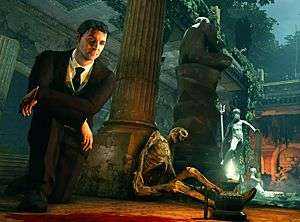 As each case develops, players can continually connect the dots thanks to the deduction screen, which presents each major clue, motive or train of thought as a different neuron in Sherlock’s brain. If they combine into one singular, rational thought, then the synapses will fire off and link the neurons together and give the player the opportunity to convict their suspect, absolve them of their crime, or continue the investigation until they’re satisfied with their answer. Some neurons will provide the player with two different scenarios to choose between, and if any of your choices contradict each other, then they’ll glow red until you correct them, ridding your thought process of plot-holes, even if it doesn’t guarantee you’ll catch the killer.
As each case develops, players can continually connect the dots thanks to the deduction screen, which presents each major clue, motive or train of thought as a different neuron in Sherlock’s brain. If they combine into one singular, rational thought, then the synapses will fire off and link the neurons together and give the player the opportunity to convict their suspect, absolve them of their crime, or continue the investigation until they’re satisfied with their answer. Some neurons will provide the player with two different scenarios to choose between, and if any of your choices contradict each other, then they’ll glow red until you correct them, ridding your thought process of plot-holes, even if it doesn’t guarantee you’ll catch the killer.
Once you think you’ve solved the case, you’ll also be given the choice whether to condemn or absolve the guilty party. Should you believe their crime to be one of circumstance, or one where the victim basically kind of deserved it, then you can pick the latter choice, often prompting Sherlock to let them go, or to persuade the courts for a smaller sentence for a lesser felony that they also may have committed. If you don’t think they deserve that reprieve, then you can have them arrested, found guilty, and possibly hung for their heinous crimes.
It’s a great idea and a feature with plenty of potential, but unfortunately it isn’t entirely fulfilled by the time the credits roll. In fact, Crimes and Punishments‘ greatest draw is also its greatest weakness, and one that the game fails to overcome. While the idea of having multiple suspects who are all just as likely to have killed the victim is a brilliant idea in theory, in practice it’s wholly underwhelming, and one that soon loses its appeal.
It’s a case of poor execution more than anything else, because in the process of making each mystery ambiguous enough that anyone could have done it, they’ve made it extremely difficult to actually care. When a case presents you with three different potential suspects, each with their own vague reasonings for pulling off the crime, reaching your answer means having to ignore some combination of compelling evidence or making some massive leaps in logic. If anyone could have done the murder, then it’s less a case of gathering the evidence, connecting the synapses and getting your man than it is just putting in some vague guesswork and hoping for the best.
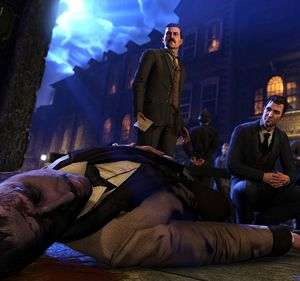 This problem is at its worst during the third case. The murder takes place in a locked room of a renovated Roman Bath House, meaning that the culprit couldn’t have been anyone outside of it. After initially inspecting the scene and interrogating the suspects, the rest of the case has you explore a bunch of locations where the murder didn’t happen, only to see you essentially raiding a tomb none of the suspects have visted because it’s the only way that Sherlock can prove without a shadow of a doubt who the murderer was and why. Then, to add insult to injury, you could get the right culprit but still get the answer wrong because you didn’t pick the correct murder weapon between your two near-identical choices, and either selection forces you to ignore a massive piece of otherwise-unexplainable evidence. At best, it’s a vaguely interesting way to legitimise guesswork, at worse it’s another bit of irritating busywork in a game that’s occasionally full of it.
This problem is at its worst during the third case. The murder takes place in a locked room of a renovated Roman Bath House, meaning that the culprit couldn’t have been anyone outside of it. After initially inspecting the scene and interrogating the suspects, the rest of the case has you explore a bunch of locations where the murder didn’t happen, only to see you essentially raiding a tomb none of the suspects have visted because it’s the only way that Sherlock can prove without a shadow of a doubt who the murderer was and why. Then, to add insult to injury, you could get the right culprit but still get the answer wrong because you didn’t pick the correct murder weapon between your two near-identical choices, and either selection forces you to ignore a massive piece of otherwise-unexplainable evidence. At best, it’s a vaguely interesting way to legitimise guesswork, at worse it’s another bit of irritating busywork in a game that’s occasionally full of it.
It doesn’t take too long for the game to eventually drop this idea, too. Two of the last three episodes viciously rail-road you into your solution by having them be the only logical conclusion you can gather once you’ve gathered all of the available clues. You can always finish a case as soon as you have enough evidence to make a single deduction, but you soon learn that the answers closest to the truth tend to come up once you’ve found everything, so any remotely savvy players will just wait until they have everything before nonchalantly picking out the murderer. It also doesn’t help that – for the Steam version, at least – the achievements rather blatantly spoil the outcome of each case and don’t have the decency to remain secret until unlocked, meaning you could – as I did – accidentally spoil the outcome of some cases with an errant flick of the mouse.
 |
 |
 |
 |
 |
 |
That wouldn’t be so much of a problem if the writing was impeccable, but the best way to describe it is odd. There are some stellar bits of dialogue scattered throughout, and once a case hooks you, it can seem hard for you to wriggle loose, but once it undermines itself it’s all too easy to free yourself. Really, the writing isn’t quite up to scratch for what the developers wanted to achieve with this instalment of Sherlock Holmes, so it tends to succeed and fall short in equal measure.
The constant need for ambiguity in each episode means that your encounters with each suspect are surface-level, so you never really feel like you know enough about each character or that you have enough evidence to make your choices, and that feeling can persist even if you have every clue at your disposal. Sometimes, it feels less like you’re making a rational decision based on what’s in front of you and more like you’re just giving it your ad-hoc reckon. It’s made even more difficult by the fact that the right answer occasionally demands that you dismiss or outright ignore several pieces of evidence and trains of logic, which can lead to some serious unanswered questions, if not gaping plot-holes. This all combines to make some endings feel a bit random, as if they just threw a dart at the wall while blindfolded, if not a bit frustrating thanks to questions you’re left with that you know will never be answered.
And what of that moral choice dilemma that Crimes and Punishments seems to trade itself on so vigorously? Honestly, I never found myself having to hesitate when making any decisions thanks to the aforementioned surface-level encounters; it’s hard to sympathise with a character I’ve only spoken to once, especially when they’ve also murdered a person to death. On purpose.
“Odd” is definitely the most apt way to describe the writing, because it’s sure as hell not all that consistent, and there’s a persistent feeling that each case was handled by a completely different writer. In the first case, Sherlock comes across as a sociopath at the best of times, not only within his actions during the opening sequence, but also through the way he talks to those around him; he’s frequently callous to others and it’s not clear whether he’s doing it knowingly or obliviously. Yet, after that episode, he doesn’t really act that way again. He has some brief moments in one of the final episodes, but it’s unclear why he goes from sixty to zero so quickly that you could get whiplash just watching him.
 There are moments at the beginning of some cases where you get glimpses of Sherlock doing something so quirky you could put a hashtag in front of it – including one where the entire joke is that he’s filled the house with bees that are never mentioned again – but those feel more like the writing staff had just binge-watched BBC’s Sherlock and were a bit too sincere with their flattery. Conversely, Watson does so little throughout the adventure that – outside of the occasional cut-scene – I started questioning why he was even there at all.
There are moments at the beginning of some cases where you get glimpses of Sherlock doing something so quirky you could put a hashtag in front of it – including one where the entire joke is that he’s filled the house with bees that are never mentioned again – but those feel more like the writing staff had just binge-watched BBC’s Sherlock and were a bit too sincere with their flattery. Conversely, Watson does so little throughout the adventure that – outside of the occasional cut-scene – I started questioning why he was even there at all.
The last real problem with the writing is that even though it’s episodic in nature and each case is relatively self-contained, there’s no arc. Well, there’s not a proper one, anyway. There’s an attempt to have one thanks to the presence of some characters who are mentioned off-handedly once or twice only to show up right at the very end, but there’s no build-up and thus no incentive to care. Crimes and Punishments really is just a random jumble of cases somebody put together – we’re talking about a game where the fourth case out of six is barely an hour long and easier than the tutorial level by some margin – and while it’s a great idea that’s executed well in its own regard, it makes the attempted ending confusing and, ultimately, pointless.
Sherlock doesn’t live and die through writing alone, however, there’s also the matter of the puzzles. For the most part, some of the puzzles are quite well-made, and do well to put you in the shoes of the great detective. There are plenty of brainteasers to go around, but with the exception of one particular puzzle in the third case, I never found myself spending too long on the solution or getting frustrated. Even when you know what you need to do, it’s not too bad going through the motions, because there’s always the chance that you’ll discover something you didn’t quite expect. If you do find yourself getting hung up, then after a minute or so the game will provide the option to let you skip the task; there’s an incentive not to by giving you achievements, but you can skip more than a few and still nab them all (for the record, I only skipped one).
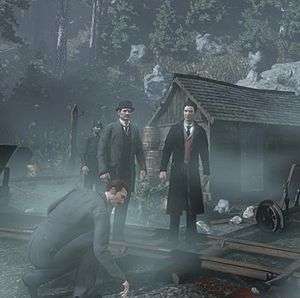 Not all of the puzzles or tasks are interesting or fun, however, and there are plenty of moments where the game is more than content with giving you some pointless busywork to pad out the length of each episode. You’ll search a desk and pick up an item, only instead of giving you the pertinent information straight away, you need to slowly rotate the object around before you’re then able to read it. You’ll find items that you know you’ll need later on, but can’t pick them up until the story demands it, necessitating needless backtracking. The worst of these are when you need to go back to a location to perform a single task – say, picking up Toby the Dog to sniff for clues – meaning that you have to go through a long loading sequence, take about thirty seconds to get what you came for, then sit through another long load time just to get back to where you needed to go. It’s tediously adding in extra steps to elongate the length of the case at a cost to the overall experience.
Not all of the puzzles or tasks are interesting or fun, however, and there are plenty of moments where the game is more than content with giving you some pointless busywork to pad out the length of each episode. You’ll search a desk and pick up an item, only instead of giving you the pertinent information straight away, you need to slowly rotate the object around before you’re then able to read it. You’ll find items that you know you’ll need later on, but can’t pick them up until the story demands it, necessitating needless backtracking. The worst of these are when you need to go back to a location to perform a single task – say, picking up Toby the Dog to sniff for clues – meaning that you have to go through a long loading sequence, take about thirty seconds to get what you came for, then sit through another long load time just to get back to where you needed to go. It’s tediously adding in extra steps to elongate the length of the case at a cost to the overall experience.
Crimes and Punishments is Frogwares’ first foray into using the Unreal engine, and it’s certainly a step up graphically from their previous adventures. While the graphics aren’t liable to win awards any time soon, they easily get the job done and each environment comes across as superbly detailed. Players can flit between third and first-person views on a whim, and it’s easy to find yourself swapping over so you can enjoy the environment in one mode before continuing the adventure in another. There was a lingering feeling that it’s not entirely optimised for PC, as the frame-rate frequently skipped about despite being less graphically intensive than Middle-Earth: Shadow of Mordor, which didn’t drop on me once.
The music is ultimately forgettable and, truth be told, I often forgot there even was music at the best of times. On the other hand, the voice-acting is far more memorable, although that’s not entirely a compliment. Much like the writing, the voice-acting can be a bit inconsistent; for every well-delivered line, there’s one that makes you wince and wish they did another take, and for every good performance, there’s a bad one waiting to pounce on you.
When it comes down to it, Crimes and Punishments is an odd one to judge. It’s clear throughout the running time that there’s plenty of potential and great ideas, but they were often muddied or undermined by the fact that its biggest draws were simultaneously its greatest weaknesses. Splitting the action into different episodes instead of one big mystery was a grand idea in theory, but in practice comes across as inconsistent, especially when the ending tries to build on a momentum that was never there. There’s a great variety of puzzles, but they’re counter-balanced with pointless busywork. Having murders where anyone could have done it and the player could accuse the wrong person was precisely the reason I was interested in the game in the first place, but in their quest to make cases ambiguous Frogwares forgot to make the characters and events compelling or memorable. As such, it’s a tough recommendation to make to those who aren’t fans of the series or who live and breathe adventure games. Sherlock Holmes: Crimes and Punishments has plenty of promise and great ideas, but ultimately isn’t nearly as brilliant and clever as the detective it’s based on.
Pros- Easily the best looking game in the series
- Splitting the action into several different mysteries rather than one big story makes it easier to pick up and play
- Some varied, interesting and well-balanced puzzles that will keep you thinking long enough that you don't find them too easy or too frustrating
- The idea that each case has several potential conclusions and that players can get it wrong is one with plenty of potential...
- ...But eventually proves to be the game's biggest weakness, as in the process of making sure that anyone could have been the killer the writing becomes too ambiguous to be compelling or provide satisfactory conclusions
- The ending seems to come out of nowhere and doesn't really achieve anything
- The presence of moral choices feels a bit pointless
- The episodic format can make the experience come across as inconsistent and disjointed
- Just enough bad dialogue and voice-acting to become annoying and immersion-breaking
- Some puzzles or tasks are little more than irritating busywork designed to pad out the length of each case
Sherlock Holmes: Crimes and Punishments should be brilliant. It should be, but it ultimately isn't. While it's full of great ideas, it also fails to capitalise on any of them, and so the majority of the experience feels like a missed opportunity. While it's by no means bad, it's certainly disappointing, especially when the features meant to differentiate this instalment from its predecessors are what eventually let it down. There's a framework for something truly special hidden within Crimes and Punishments, it's just a shame that Frogwares couldn't find it.
Last five articles by Edward
- Best of 2015: Journey's End: A New Beginning
- Journey's End: A New Beginning
- You Can't Choose Your Happy Ending
- Okay, Let's Fix Comedy In Games - The V-Effekt
- Time Keeps On Smashing Away




















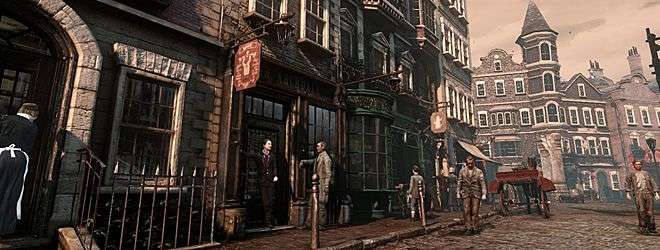
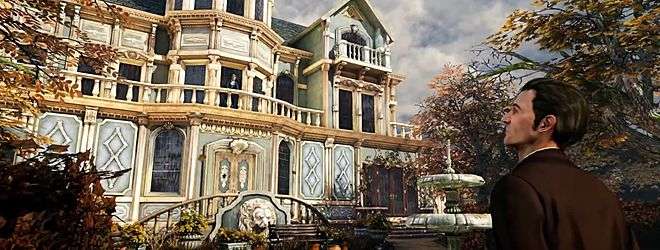

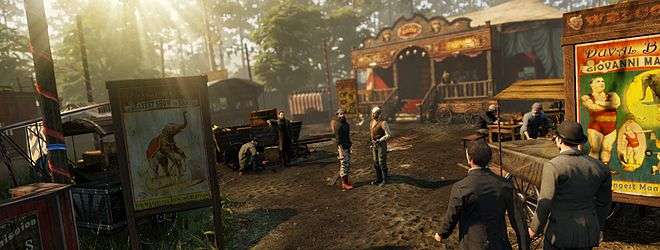







I totaly disagree with your cons. Dialogs are awesome, give a good cinematic feeling, puzzles often are just a piece of cake, endings and episodic nature of a game is totaly splendid!